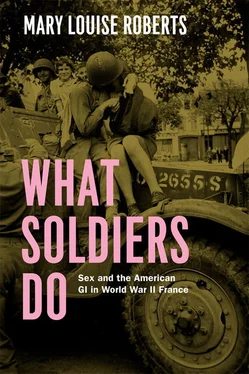Amerilots, 103, 104, 108. See also American GIs and French civilians
AMGOT (Allied Military Government for Occupied Territories), 5, 263n6
Anderson, Roy, 207
Anne, Antoine, 24–25, 32, 33
Armagnac, Cécile, 48
Aubéry, Pierre, 109, 113, 125, 131, 152
Aubrac, Lucie, 25
Avignon, Raymond, 26
Bailey, Milbert, 333–34n2
Barbès, Violette de, 148
Battle of Normandy: civilian casualties due to the campaign, 17, 265n8; damage done to lives and towns, 24–27; D-day military casualties, 15; disrespect for civilians by the GIs, 30–31; errors in Ambrose’s portrayals of French civilians, 17–18; French civilians’ reactions to D-day, 20–22; GI prejudices about the French, 19–20, 258, 260; GIs and the Norman children, 37–39, 42–43; GIs’ difficulty with the French language, 43–47; GIs’ dismay at the results of the bombings, 27–30; GIs’ reaction to cultural differences and brought stereotypes, 19–20; GIs’ sense of alienation in France, 18–19; growing anti-Americanism due to the imprecision of the bombing campaign, 22–24, 266n29, 267n35; historians’ marginalization of the French, 16; impression the US military complex made on the Normans, 48–49; legacy of the Normandy landings, 15–16, 265n2; means of communication between civilian and soldier, 47–48; mutual mistrust between the GIs and civilians, 35–36; negative impression made by Norman quality of life on the Americans, 49–54; Norman anguish due to uncertainty of the outcome, 27; Norman memories of the Americans, 33, 39; Normans’ difficulty with the English language, 47; Normans’ exposure to the fighting, 32–34; Normans’ provision of aid to the Americans, 34–35; Normans’ reactions to first seeing Americans, 17; Norman stoicism during, 29, 36–37; Norman treatment of the bodies of German versus American soldiers, 40–42; “perfume of cigarettes,” 42, 227n216; price paid by the population for liberation, 27, 255–56, 268nn73–77; reality of Norman women’s attitude toward sex, 53; remembrances of the smell of death, 39–40; resurfacing of historical racial prejudices of the French, 257–58; sounds of war, 31–32; tastes associated with the liberation, 42–43; violence against the civilian population in Le Havre, 74–75
Baxter, John, 18
Bazin, Charles-Henri-Guy, 103–4, 105, 106
Béchot, Michel, 120
Bell, Leonard, 207, 221, 329n123
Belpulsi, Peter, 46, 61, 117, 118, 122, 134
Bertier, Jean-Charles, 130
Bertreux, Chanoine, 33
Berube, Alan, 174
Bigeon, Suzanne, 250
Bistrica, John, 96
Black, Timuel, 219
black market: civilian awe at American food supplies, 117; interactions based on cigarettes’ popularity, 118–20, 296n52; kinship with prostitution, 125–26; levels of operation during the war, 116; mutually beneficial trading, 117–18
black soldiers. See African American soldiers
black terror on the Bocage : absence of rape cases in Paris, 242, 335n26; American “invasion” symbolized by black soldiers, 247; French critiques of the military court system, 252–53; French equating of sexual violence to national humiliation, 249–51, 339n84, 339n94; French history of power dynamics based on sex and white supremacy, 247–49, 337n65, 338n68; French reaction to the swiftness of rape convictions, 252–54; prevalence of rumors in rural France, 241–42; racial prejudice of the French, 240, 243; rape hysteria in the provinces, 243, 245–47, 336n31; resurfacing of historical racial prejudices of the French, 257–58; spread of fear of African American soldiers in Normandy, 244–45, 336n37, 336nn50–51; widespread reports and fear of rapes in France, 239–40, 333n2
Blaise, Louis, 35, 40
blond cigarettes, 118–19
Blue and Gray Corral, 159, 310n3, 319n161
Blum, Léon, 106, 292n144
Boesch, Paul, 29, 53, 119
Boislambert, Claude Hettier de, 31
boîtes aux soldats (factories of love), 140
boniches , 130–31, 132
Bonifas, Aimé, 102, 104
Bonner, Walter, 165
Boudier, Norman Yves, 243
Bourdon, Claude, 24
Bourret, Victor, 284n7
Bowen, Sidney, 28
Bradley, Omar, 174
Braley, Michel, 32, 34, 48
Bré, Gilles, 38
Bridges, Tommy, 224
Brinton, Crane, 90–91
Broadus, Ora B., 218
Broeckz, Fernand, 32
brothels. See military’s view of prostitution
Brown, Walter, 122, 126, 134, 157, 221
Bruller, Jean (Vercors), 284n6
Brunet, Abbé, 268n74
Brunsell, William, 134, 172
Bryder, Linda, 320n180
Bureau, Jacques, 102, 103
Burgett, Donald, 35
CA (Civil Affairs), 6, 24, 124
Cagny, Bernard and Solange de, 31
Camp Philip Morris, 293n170
Cane, Lawrence, 49, 97–98, 117
Capa, Robert, 79
Capell, Jack, 122, 150
Cardot, Robert, 104–5
Castex, André, 102
Caussé, Georges, 103, 105
Cazaux, Yves, 98
Ce soir , 67, 123
CFLN (French Committee of National Liberation), 5, 23, 263n7
Champs Elysées, 150
Chamson, André, 86
Chauffier, Louis Martin, 91
chef de famille role of French men, 86–87, 92, 284nn3–7
Chevalier, Louis, 296n93
Chevance-Bertin, Maurice, 76
chewing gum, 42–43, 274n216
Chicago Defender , 232, 238
children: French civilians’ outcries against public prostitution, 188; GI photos ignoring GIs bonding with children, 62–63; GIs’ relationships with the Norman children, 37–39, 42–43, 47
chocolate, 35, 42, 47, 122
Churchill, Winston, 5
cigarettes: GIs profiting from, 122; interactions based on cigarettes’ popularity, 118–20, 296n52; shift in meaning as a token of friendship, 125; use as tools of corruption, 122
Civil Affairs (CA), 6, 24, 124
Clarkson, Karl, 51, 52, 152
Clausse, Robert, 33
Cointré, Marie-Thèrése, 133, 137–38, 142, 145–46, 147, 150, 152, 154
Coletti, James, 124
Communications Zone (ComZ), 202–4
condoms distribution by the army, 168, 171
Conversy, Marcel, 102
Cooper, John David, 210
Copans, Sim, 25
Costigliola, Frank, 128
Couillard, Auguste, 33
Coulet, François, 6, 264n11
Crayton, Corporal, 28
Crisis, The , 232, 331n177
Curtis, Jean-Louis, 100
Dabrin, Henri, 246
Daladier, Edouard, 103
Damsky, Bert, 126, 128, 166
Dargols, Sergeant, 53
Davis, Arthur E., 207, 326n69
Davis, Benjamin O., 234–35, 329n142, 332n191
Davis, John, 207, 209, 327n85
Davison, Tommie, 222
“Dear John” letters, 68
Debû-Bridel, Jacques, 87
de Gaulle, Charles, 5, 6, 90, 91, 130, 162, 177, 263n7, 311n11
Delpierre, Christiane, 38, 47, 117
Denis, Christianne, 119
Dépériers, Madame, 35
Dernier Village, Le (Chamson), 86
Déroute (Debû-Bridel), 87
Des Moines Register , 68
Desprairies, Pierre, 32
Destors, Madame, 39
Devers, Jacob, 162
displaced person (DP) girls, 105, 292n140
Dold-Lomet, Madame, 25
Dower, John, 131
Downes, William, 210
Duckett, Alfred, 219
Dufaut, Victor, 105
Dufour, Abbé, 119
Duhamel, George, 24, 131
Dumbarton Oaks, 90, 91
Dunn, John, 172
Dutourd, Jean, 87, 284n5
Eames, Warren, 108
Earle, John, 122, 124
Eastland, James O., 235–36, 333nn196–200
Easton, Robert, 28, 89, 92
Edinger, Joseph, 37, 44
eggs market, 118
Eighty-Second Airborne Division, 15, 34
Eisenhower, Dwight, 60, 227
Eisenstaedt, Alfred, 258
Enderton, Herbert, 30
Eudes, Odette, 34
Eudier, Louis, 107
European Theater of Operations (ETO), 18, 162, 195, 196, 198, 199, 201, 209, 213, 225, 233, 235, 240
Читать дальше












